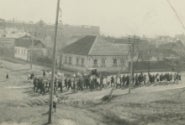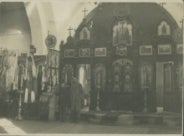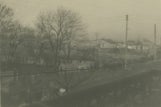Dana Porter Library, first floor
University of Waterloo Library
Waterloo, Ontario N2L 3G1
519-888-4567 x42619 or x42445
Violence as a government tool became increasingly intensive and widespread throughout the 1930s. Having begun in the early decade with area- and group-specific campaigns, the mass violence quickly evolved into nation-wide purges of anyone deemed to be enemies of the state.
As foreigners, Harry and Violet were in many ways immune to the violence of the regime. While the Byers did not personally experience violence however, they were nonetheless observers of the violence inflicted on the people around them. Yet, as neither Harry nor Violet could speak Russian, the couple often did not understand what was going on until much later.
Strange doings going on. Can't underStand will find out Soon. more men + women hit the trail to-day. Steeple shot at again + more windows shattered.-
 During the Byers’ stay, state violence was still concentrated in the rural countryside, where Harry was often placed for work. Peasants who resisted collectivization (i.e. kulaks) were primarily the targets for arrest, deportation, and execution. However, minorities, anti-revolutionaries, and those opposing the regime were also eradicated alongside kulaks. In this photo, men and women can be seen marching down the streets of Grozny. Inscribed on its back, Harry wrote: "One of the billion demonstrations of the "masses" during 1931".
During the Byers’ stay, state violence was still concentrated in the rural countryside, where Harry was often placed for work. Peasants who resisted collectivization (i.e. kulaks) were primarily the targets for arrest, deportation, and execution. However, minorities, anti-revolutionaries, and those opposing the regime were also eradicated alongside kulaks. In this photo, men and women can be seen marching down the streets of Grozny. Inscribed on its back, Harry wrote: "One of the billion demonstrations of the "masses" during 1931".
Many Prisoners are Being taken to Jail. See many women. & old Chinese men, with guards. [...]
Big parade to-day. Hundreds of Soldiers Marching, Could not understand. found out they were Celebrating Because 200 People, ante [i.e., anti] Rev [i.e., Revolution] were Shot, at Leningrad.
 Religion too, was heavily suppressed under Stalin’s atheist state in the 1930’s. Not only were churches and religious property systematically destroyed, but church officials were also persecuted. In this photo (taken November 20, 1930), Harry can be seen posing in a still-intact Nikolsk church.
Religion too, was heavily suppressed under Stalin’s atheist state in the 1930’s. Not only were churches and religious property systematically destroyed, but church officials were also persecuted. In this photo (taken November 20, 1930), Harry can be seen posing in a still-intact Nikolsk church.
[...] Soldiers shooting glass out of church windows.
Some one shoots at the Church Bell. every morning about [underlined: 2]. I Can plainly here [i.e. hear] rife [i.e. rifle] shot, and one ding from Bell. [...]
By the time the Byers left the Union of Soviet Socialist Republics (USSR), violent campaigns shifted from the countryside to urban centres. This was followed by intensive state-wide purges of all who were deemed to be enemies of state. Although Harry and Violet did not experience the full scale of brutality under Stalin, they nonetheless lived in the countryside where violence was at its most severe at the time.











